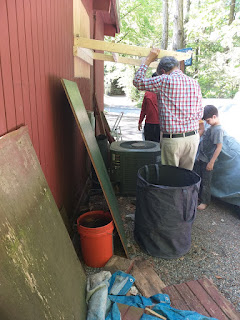 |
| Father and son working on a project |
First off: work with what you got. Why go to a hardware store when there is something around the house that might work? Now islanders are sometimes forced into working with what they have because the islands doesn’t have what they need or they don’t have the money for the supplies even if they are available, but I have been astounded at the way Islanders will pull out an old flip-flop, a flimsy plastic bag, broken pieces of pipe or wood, even ash from a fire, to make workable fixes to many a house project. Dad’s garage lends itself to that. It’s the kind of garage that has all sorts of wood, tools, screws and nails about. If you look long enough and if you aren’t too worried about exact symmetry, it’s amazing what you can find. There is a side principle that goes along with this one: keep the scraps. You never know when those two extra screws or short piece of wood might come in handy!

Another principle: the right tool might make all the difference, but you can usually find a way with the tools you’ve got. Island ingenuity often comes into play here. Who needs a hammer if a rock is close at hand? A table saw would work well, for cutting this piece of wood, but all I’ve got is a hack saw, so let’s get hacking! Now, Dad’s tools are by far more prolific than most islanders I know. (He has multiple hammers and a table saw.) But there’s many a time when we make do with what we’ve got. We find a way to make it work, and that is very much an island thing to do.
This leads to a third very similar principle: Slow and steady. Dad, like Islanders, takes his time. There really isn’t a rush with these things. Work with what you’ve got. Think it through. Take your time. Islanders are rarely in a rush. The job will get done when it gets done. Dad has that attitude too. Although this might actually reveal a subtle difference. Dad is deliberately slow in order to be thoughtful and avoid making mistakes. Islanders just tend to take their time with things even if they aren’t being particularly careful.
Finally, you always tend to end up at the same hardware store. For Dad, when in doubt, he goes to Home Depot (sorry Lowe’s fans). For islanders in our town it works out the same way. There may be a dozen hardware stores in town (I’ve been to most of them), but there’s only one that really carries the things you need. Talk to anyone doing home improvement in our town and it is given that they will be stopping by Djamal’s shop. The other hardware shops will tell you to go there too! He’s the only one who seems to have the supply. There’s security in the familiar supplier.
 |
| Kids looking through wood scraps |
PRAYERS ANSWERED
The biggest holiday of the island year was on Memorial Day and it sounds like the orders to stay at home were mostly followed. Our teammates reported a very quiet day and we had several calls with islanders for the holiday— we posted a short video with holiday greetings to our island Facebook account and it already has over 37,000 views! Our colleague on the big island has been encouraged by the fact that translation work via telephone has gone well— a pleasant surprise.
PRAYERS REQUESTED
Pray for our teammates and colleagues on the islands as they navigate trying to reach out to islanders at this time. One of our colleagues on the small island prayed for a man who has problems with his eyesight and has also been able to share truth with him— pray for this man’s healing and the opening of his heart. There are plans to try to mediate reconciliation between the two parties at the heart of the argument that played out on social media (see last week’s blog) as it has revealed some deeper, long-standing issues between them. Ma Imani’s daughter has been having recurring nosebleeds that have been causing concern—while this thankfully does not sound like COVID, please pray for her health.








